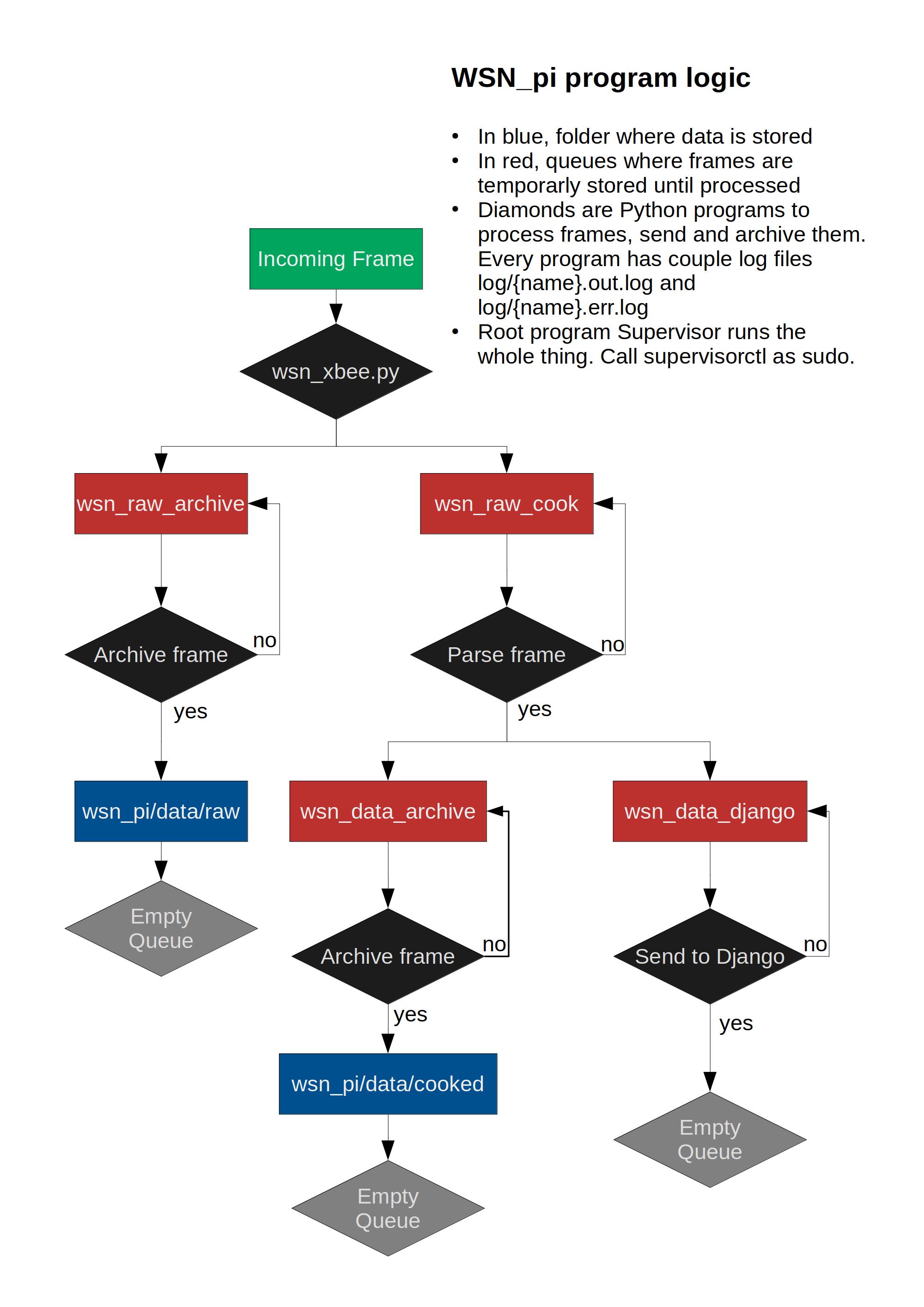Once the Raspberry Pi is installed, configure the system for the hardware as described below, depending on the network option used.
The user that will be running the software must belong to the dialout and gpio groups.
Run raspi-config and go to Interface Options, Serial Port:
Would you like a login shell be accessible over serial?
<No>
Would you like the serial port hardware to be enabled?
<Yes>
Then reboot.
For more information see https://github.com/AmedeeBulle/pyrak811
Python 3.7 or later is required.
Install system wide requirements:
$ sudo apt install python3-venv rabbitmq-server supervisor
Clone the wsn_pi repository:
$ git clone git@github.com:spectraphilic/wsn_pi.git
$ cd wsn_pi
Copy a configuration file and edit it, for example:
$ ls -1 configs/
config_lora_riot.ini
config_lora_waspmote.ini
config_usb.ini
config_xbee.ini
$ cp configs/config_lora_waspmote.ini config.ini
Then edit config.ini as needed.
Build:
$ make install
$ make etc
Create a symbolic link, as root, to the supervisor configuration:
$ sudo cp $PWD/var/wsn-pi.service /etc/systemd/system/
$ systemctl daemon-reload
$ sudo systemctl start wsn-pi.service
$ sudo systemctl enable wsn-pi.service
To get the firmware version:
$ source venv/bin/activate
$ rak811v3 hard-reset
$ rak811v3 version
List plugins:
# rabbitmq-plugins list
Example, the management plugin:
# rabbitmq-plugins enable rabbitmq_management
With the management plugin enabled, you can:
- Go to http://localhost:15672/ and enter with username and password "guest".
- Use the command line rabbitmqadmin
XXX Do we need rabbitmq_management?
Informational:
$ sudo rabbitmqctl list_exchanges
$ sudo rabbitmqctl list_queues
$ sudo rabbitmqctl list_bindings
$ sudo rabbitmqctl list_connections
$ sudo rabbitmqctl list_channels
$ sudo rabbitmqctl list_consumers
$ sudo rabbitmqctl status
Maintenance:
$ sudo rabbitmqctl purge_queue <name>
Everything below is done in the server.
Enable federation plugin:
# rabbitmq-plugins enable rabbitmq_federation
# rabbitmq-plugins enable rabbitmq_federation_management
Define the upstream:
# rabbitmqctl set_parameter federation-upstream finse_pi '{"uri":"amqp://129.240.244.148"}'
# rabbitmqctl set_parameter federation-upstream cs_pi '{"uri":"amqp://192.168.1.133"}'
Verify:
# rabbitmqctl list_parameters
Define a policy, and verify:
# rabbitmqctl set_policy --apply-to exchanges wsn "^wsn$" '{"federation-upstream-set":"all"}'
# rabbitmqctl list_policies
# rabbitmqctl eval 'rabbit_federation_status:status().'
The programs are managed by Supervisor, use supervisorctl to control them.
Supervisor runs as root, so you will need to run supervisorctl as root, or
use sudo.
The programs run in the foreground, Supervisor puts them in the background, and restarts them if they exit.
Check that the programs are running:
meshpiuio@raspberrypi:~/github/wsn_pi $ sudo supervisorctl status
wsn_data_archive RUNNING pid 1063, uptime 1:20:56
wsn_data_django RUNNING pid 1054, uptime 1:20:57
wsn_raw_archive RUNNING pid 1084, uptime 1:20:52
wsn_raw_cook RUNNING pid 1064, uptime 1:20:56
wsn_xbee RUNNING pid 1075, uptime 1:20:55
Restart programs when issues arise:
meshpiuio@raspberrypi:~/github/wsn_pi $ sudo supervisorctl restart all
Enter the supervisorctl shell:
meshpiuio@raspberrypi:~/github/wsn_pi $ sudo supervisorctl status
